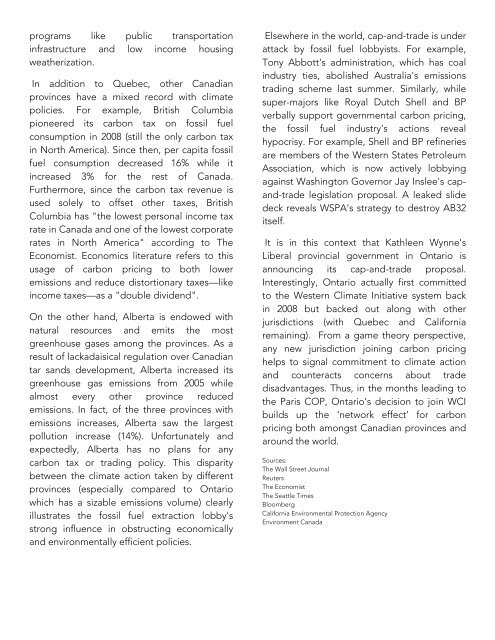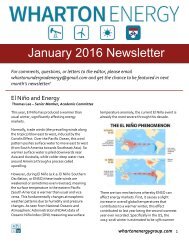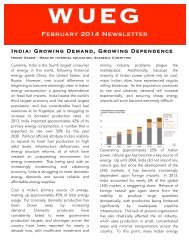You also want an ePaper? Increase the reach of your titles
YUMPU automatically turns print PDFs into web optimized ePapers that Google loves.
programs like public transportation<br />
infrastructure and low income housing<br />
weatherization.<br />
In addition to Quebec, other Canadian<br />
provinces have a mixed record with climate<br />
policies. For example, British Columbia<br />
pioneered its carbon tax on fossil fuel<br />
consumption in 2008 (still the only carbon tax<br />
in North America). Since then, per capita fossil<br />
fuel consumption decreased 16% while it<br />
increased 3% for the rest of Canada.<br />
Furthermore, since the carbon tax revenue is<br />
used solely to offset other taxes, British<br />
Columbia has "the lowest personal income tax<br />
rate in Canada and one of the lowest corporate<br />
rates in North America" according to The<br />
Economist. Economics literature refers to this<br />
usage of carbon pricing to both lower<br />
emissions and reduce distortionary taxes—like<br />
income taxes—as a "double dividend".<br />
On the other hand, Alberta is endowed with<br />
natural resources and emits the most<br />
greenhouse gases among the provinces. As a<br />
result of lackadaisical regulation over Canadian<br />
tar sands development, Alberta increased its<br />
greenhouse gas emissions from 2005 while<br />
almost every other province reduced<br />
emissions. In fact, of the three provinces with<br />
emissions increases, Alberta saw the largest<br />
pollution increase (14%). Unfortunately and<br />
expectedly, Alberta has no plans for any<br />
carbon tax or trading policy. This disparity<br />
between the climate action taken by different<br />
provinces (especially compared to Ontario<br />
which has a sizable emissions volume) clearly<br />
illustrates the fossil fuel extraction lobby's<br />
strong influence in obstructing economically<br />
and environmentally efficient policies.<br />
Elsewhere in the world, cap-and-trade is under<br />
attack by fossil fuel lobbyists. For example,<br />
Tony Abbott's administration, which has coal<br />
industry ties, abolished Australia's emissions<br />
trading scheme last summer. Similarly, while<br />
super-majors like Royal Dutch Shell and BP<br />
verbally support governmental carbon pricing,<br />
the fossil fuel industry's actions reveal<br />
hypocrisy. For example, Shell and BP refineries<br />
are members of the Western States Petroleum<br />
Association, which is now actively lobbying<br />
against Washington Governor Jay Inslee's capand-trade<br />
legislation proposal. A leaked slide<br />
deck reveals WSPA’s strategy to destroy AB32<br />
itself.<br />
It is in this context that Kathleen Wynne's<br />
Liberal provincial government in Ontario is<br />
announcing its cap-and-trade proposal.<br />
Interestingly, Ontario actually first committed<br />
to the Western Climate Initiative system back<br />
in 2008 but backed out along with other<br />
jurisdictions (with Quebec and California<br />
remaining). From a game theory perspective,<br />
any new jurisdiction joining carbon pricing<br />
helps to signal commitment to climate action<br />
and counteracts concerns about trade<br />
disadvantages. Thus, in the months leading to<br />
the Paris COP, Ontario's decision to join WCI<br />
builds up the ‘network effect’ for carbon<br />
pricing both amongst Canadian provinces and<br />
around the world.<br />
Sources:<br />
The Wall Street Journal<br />
Reuters<br />
The Economist<br />
The Seattle Times<br />
Bloomberg<br />
California Environmental Protection Agency<br />
Environment Canada









